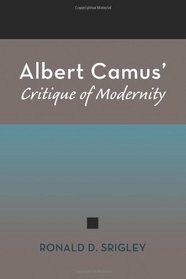Search -
Albert Camus' Critique of Modernity
Albert Camus' Critique of Modernity
Author:
�Nobel Prize winner Albert Camus? contributions to political and cultural analysis make him one of the most important writers of the twentieth century. Camus? writing has been heavily researched and analyzed in academia, with many scholars concentrating on the formal tri-part structure he adhered to in his later work: the cycle that divided his ... more »
Author:
�Nobel Prize winner Albert Camus? contributions to political and cultural analysis make him one of the most important writers of the twentieth century. Camus? writing has been heavily researched and analyzed in academia, with many scholars concentrating on the formal tri-part structure he adhered to in his later work: the cycle that divided his ... more »
ISBN-13: 9780826219244
ISBN-10: 0826219241
Publication Date: 6/20/2011
Pages: 202
Rating: ?
ISBN-10: 0826219241
Publication Date: 6/20/2011
Pages: 202
Rating: ?
0 stars, based on 0 rating
Publisher: University of Missouri
Book Type: Hardcover
Members Wishing: 1
Reviews: Amazon | Write a Review
Book Type: Hardcover
Members Wishing: 1
Reviews: Amazon | Write a Review
Genres:




